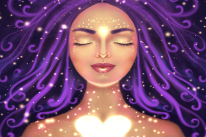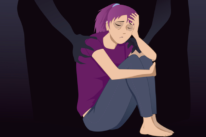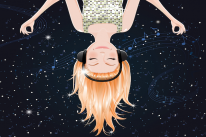
“Fear has its use but cowardice has none.” ~Gandhi
On Monday, my boyfriend and I took a ferry to Catalina Island, where we planned to spend the night.
I knew the island would be quaint and charming, which was a big part of its appeal, but I was mostly looking forward to breathing in the salty ocean air.
From vacations enjoyed with beachside lounging, to summer days spent running along the shore, some of my favorite memories involve the hypnotic lilt of crashing waves.
We hightailed it to the upper deck as soon as we dropped our bags, allowing ourselves the best possible view of any jumping dolphins we might encounter.
It wasn’t long before we picked up some speed, but this didn’t deter me from sticking my face into the wind.
I imagined that was what dogs feel like when they poke their heads outside car windows—completely enveloped by the cool, crisp breeze; wrapped in it and yet so free.
Thirty minutes and ten dolphin sightings in, though still windblown, I felt my cheeks go warm and flush as I giggled, “I love the ocean!”
It was the kind of pure joy that comes being fully present, clearheaded, and immersed in nature—magnified because I was sharing it with someone I love.
Three hours later, after we’d checked into our hotel and eaten lunch, I thought, “I hate the ocean.”
We’d decided to go snorkeling, something my boyfriend loves, and, theoretically, I thought I’d enjoy.
Nemo-like fish, machine-free exercise, and exploration are all things I appreciate. And we’d done it together once before in San Diego, a few months after we’d first started dating.
But back then we’d stayed in shallow water, much like I do when I swim at beach. By “swim” I mean wade out to my waist, all the while fearing death by shark.
I only possess one real fear that doesn’t involve a horrific death—the fear of being judged and rejected. Aside from that, it all comes down to catastrophic, fatal bodily harm—falling off a skyscraper, being mauled by a shark, being mauled by a tiger, being mauled by a lion.
(The mauling fears are practically endless, most likely because I first saw Jaws before I could even speak.)
Somehow when I got into the water, armed with flippers, a snorkel, a mask, and adrenaline, I forgot I wasn’t a fish. It wasn’t until I looked down and recognized I’d swum beyond the point of standing that I started freaking out.
Suddenly I worried that I might turn around, see a dark mass, and realize I had no time to escape the razor-like teeth of an approaching Great White.
Every stroke after that took a Herculean effort. If I kept stride with my boyfriend, I’d continually move away from the safety of land.
If I turned around, I’d decrease my odds of death by ingestion, but I still couldn’t be certain I’d make it safely to the sand.
I felt trapped in the middle of the dark abyss I’d just recently professed to love. It seemed a lot more beautiful when I was safely removed.
I didn’t want to leave my boyfriend alone, partly because I wanted to continue sharing the adventure, and partly because I wanted to be there for him if he needed rescuing (because clearly I’d be a great help if a hungry sea creature pulled him under the water).
Paralyzed as I was with internal conflict, I decided to do what I’d come out there to do: explore and discover.
First I reminded myself that, statistically, I was more likely to be hit by lightning than be eaten by a shark—particularly so close to the shore (the water was actually less than ten feet deep). Then I started thinking about this dichotomy of fear and love.
So frequently we read that we need to choose one or the other, and we’re best served to choose the latter.
But everything worthwhile in life entails a natural ebb and flow between the two.
We may feel scared when we first meet someone admirable and intriguing. We may feel terrified when we first attempt something new and exciting. We may feel panicked when first try something different and unproven.
The fear isn’t a sign of negativity or weakness; it’s a sign of how much we care. In a way, fear can deepen joy, passion, and love, if we learn from it and find the courage to act in spite of it.
Oftentimes, the payoff is that much sweeter because of the journey that brought us to it.
It’s the spark of a burgeoning relationship that took courage to initiate; the light of a growing passion that took boldness to pursue; or, in my case, the bliss and freedom of lilting with the waves when it felt far safer to admire them from afar.
Maybe the spark we feel when we stretch ourselves is all the brighter because it entailed a direct path through the fear.
Perhaps it’s not just the freedom and joy we crave, but the strength and insight we gain by pushing ourselves to discover them.
I love the ocean, I fear the ocean, and I know there’s always a little risk whenever you leave the shore.
But I’ve realized the shore only feels safe because it seems more predictable—and of course it isn’t. Life is always uncontrollable. Fear is a natural reaction to that.
Joy, love, and passion—these are what we feel when we take the plunge anyways, knowing we’re brave enough to accept the risk.
Photo by Ivan McClellan.
About Lori Deschene
Lori Deschene is the founder of Tiny Buddha. She started the site after struggling with depression, bulimia, c-PTSD, and toxic shame so she could recycle her former pain into something useful and inspire others to do the same. You can find her books, including Tiny Buddha’s Gratitude Journal and Tiny Buddha’s Worry Journal, here and learn more about her eCourse, Recreate Your Life Story, if you’re ready to transform your life and become the person you want to be.
- Web |
- More Posts













 Though I run this site, it is not mine. It's ours. It's not about me. It's about us. Your stories and your wisdom are just as meaningful as mine.
Though I run this site, it is not mine. It's ours. It's not about me. It's about us. Your stories and your wisdom are just as meaningful as mine.
A very sensitive story, Lori. And while I was reading it, a thought came to mind:
LOVE IS THE ABSENCE OF FEAR
Irv
Thanks Irv! I don’t know if I believe fear and love are mutually exclusive, but I know fear can limit love if we’re not mindful!
I’ve been thinking about this topic since I wrote it. Bear in mind, we can’t confuse LOVE with NEED. So many times the subtext of love in a fearful situation is something like, “I need comforting. And if I give it to you, will you give it to me?”
From my own experience, when general anxiety and worry is lifted off me, I feel a general “Love” and acceptance for everyone. When I’m tense with trepidation, I lose my tolerance for everyone.
When two people meet and fall in love, they fear nothing about each other. After a while, if the trust is broken, if they “fear” possible hurtful behavior from their partner, their love wanes.
I think human beings are naturally nurturing animals, as long as we are not threatened, whether the threat is real or imagined. Most people live in a state of constant fear of the “Other”. Consequently all the professed Love, especially religiously oriented Love, is not love at all. It’s a promise of loyalty, within dependency, to a Higher Being for protection.
If I love you, will you love and protect me?
That’s natural I guess. But is that kind of love, generated by fear, about giving or taking?
Irv
Hiya Irv,
“Falling in love” and “oblivion” share the same compartment in Davy Jones’s locker. I think when two people share all these deep feelings at the onset they tend to block out cautions they would normally have had at the onset of anything BUT love. Love is a truly liberating feeling, and we sense the celestial lifting of all things formerly blocking the emotion when we fall into it. Rumi said, “It is not love that we seek but removing all of the barriers within ourselves that stop us from love.” It is a freefall that finds us in a two-passenger plane in a power dive. The encourages the want or need to extract a promise from the other to prolong the passion, extend the joy. That also opens the door to co-dependency, placing one’s emotional well-being in the hands of another. Then one or the other (or both) lapses into fear the moment the warm and fuzzies have departed.
Respect love. Nurture it. Never take it for granted. And face it as two sharing and enjoying a third entity, the *we* that two create. Fear then becomes divided by two and much easier to dispel as an unwelcome guest.
Great post, Lori. Such an important reminded that life isn’t (and isn’t supposed to be) about avoiding fear altogether; that fear and love are inextricably linked. Thanks! P.S. I also saw Jaws very young and ever since have a fear of sharks.
Thanks Nicholas! I suspect Jaws created a lot of ocean-phobic kids!
Of all the fears you mention, Lori, you brought me right back to being in that movie theater when Jaws first came out. I was 12. That movie scared me so deeply that I would check between the shower curtain before getting into the tub! Facing our fears is walking over those hot coals to our dream over there on the other side. Thanks for this story!
I used to do the same thing with the tub, though for me, that was related to The Fly. There was this one part when the man’s head had turned into a fly’s, and he had a plastic bag over it. Soon after I saw it, my parents put a trash bag over some tiles near the tub. I was convinced the big fly head was behind it. Strange how those kinds of associations trigger irrational fears as kids!
I love this, Lori. And I’m so energized by the possibility you hint at here that trust and fear are not mutually exclusive. You leaned into trust in the very presence of your fear, and in so doing got to experience something wonderful. That very practice is one I’ve given my life to.
That’s what I hoped to convey, Kristin! I feel that same type of fear often when there isn’t necessarily any real danger (though there could be, since life is always unpredictable). I guess it all comes down to letting go and accepting the risk of living fully. That’s wonderful you practice this consistently in your life. =)
Thanks for sharing this story, Lori. Although I have to say a fear of sharks is probably pretty healthy! 😉
I think your point to us is that life is made up of contradictions and sometimes we just have to dive into them to really experience the fullness that is around and within us.
Thanks Bobbi! I hadn’t really thought about whether or not the fear was healthy–mostly because I realized it was so unlikely I’d see a shark so close to the shore, and I knew I was limiting myself from joy by obsessing about the worst case scenario. But you’re right–the fear of being eaten isn’t exactly irrational!
That was what I hoped to convey, about diving in and opening ourselves up to life. I also realized how proud I feel when I overcome my fears. Makes me appreciate them on a whole new level when I realize they give me a chance to be brave.
Lori shall i ask u something? when did this work inside urself? cause i faced a similar situation right day b fore yest’day that i broke somethin inside me………. i love 2 sing but something was resting me to death when i went 2 sing on stage… the previous day i went 2 de stage and literally oly air came through my mouth but i still knew i am there 2 sing which i love 2 do… but fortunately i broke it day bfore yesterday and i was so relieved……..so happy!!! and next i am going 2 try something which is really more special 4 me… de burning passion right frm ma childhood…… ll be there with a good news 2 u soon:) don know some happiness i get wen i share it with u… and i like to convey somethin else 2.. 4 de past ten days somethin is fresh inside me i got a new work place stopped being alone at home… ma work is amazing i really made really really good friends i am very happy…… thank u 4 ur support through tiny buddha ……may u live long and let it serve 4 de postive and growth of the entire humanity ..stating we are there 4 them… thanks a lot !!!may u live long!!!:D
Hi Shajhai,
Congrats on your new job! That’s so exciting that you’re out there, doing something different, and making new friends. You’re most welcome, regarding the site. I’m glad it’s been helpful to you. =)
I’m not sure what you’re asking, about when this worked inside of me. Can you clarify?
Lori
About this blog how long since u ve experienced it… y i ask this s cause wen i read ur first blog that i read :shown below i got shocked to see myself there and reading this current blog the core to de prob s say 70% de same in ma perspective but i c different issues it helps a LOT!!
“6 TIPS TO HELP YOU APPLY WHAT YOU’VE LEARNED i got shocked”
I experienced this just this past Monday. I wrote the post a couple days later!
This is probably my favorite of your writings, Lori. As always, right on time.
Thanks so much James. I’m glad you enjoyed it. =)
“I love the ocean, I fear the ocean, and I know there’s always a little risk whenever you leave the shore.” You *respect* the ocean. It’s a wonderful place to be. Neither one of you has a grip on the other, yet it would be effortless to allow total consumption. Totally wary or all wet. That’s how I feel about love, as well. It is so easy to get lost in love, so easy to swim beyond the reach, out of sight of the shore. Andre Gide says, “Man cannot discover new oceans unless he has the courage to lose sight of the shore.” Having been lost in love before, totally immersed and away from dry land, I too realize the spiraling heights as well as the plummeting depths realized during love’s hold on my senses.
I’ve been away from the ocean as well as away from love. I guess working in tandem suits me these days. However, I have not lost my deep and admiring respect for both. I also realize this respect will cause me to wade in the shallow end, along the beach, when I first re-encounter either. I respect the pull, the attraction, that my memory provides from former dives into the arms of the deep and boundless sea. I also recall the need for a connection, a line to safety, if you will. Respect is a great guide. It doesn’t keep you from diving into the deep blue; it does remind you to remember to breathe first.
There’s also a reason that Jaws and In-Laws rhyme. Another time.
~ Mark
I actually almost wrote that, about respecting the ocean. I love what you wrote here: “Respect is a great guide. It doesn’t keep from diving into the deep blue; it does remind you to remember to breathe first.” So true! I think respect reminds us to be mindful, with both the ocean and love. When we feel respect, we tread cautiously because we care; that’s a different kind of fear than the kind that keeps us isolated/separate.
Hahaha … “partly because I wanted to be there for him if he needed rescuing (because clearly I’d be a great help if a hungry sea creature pulled him under the water).” That was priceless!
But really, fear and embracing the unknown is the spice of life, isn’t it? Stepping out there can lead to so many things that just wouldn’t come our way on their own!
Good stuff, Lori. You have a great way of translating those things that we experience almost daily into perspectives that enlighten us all. 🙂
Thanks so much Carmelo. I really enjoy writing about everyday insights that come from just living life. And I absolutely agree–how boring life would be if we never felt those butterflies!
I live and grew up in Key West, so have spent a great deal of my life literally IN the Ocean, and have been in every type of situation you can imagine….I Still have those “AHA” moments, usually very brief when I’m reminded I’m a visitor. It always makes me appreciate the time spent there more, Thanks for putting it into words.
You’re most welcome. I grew up by the ocean as well (in Revere, Ma) and I can’t imagine what it would have been like to not live near the water. It’s such a peaceful place. And even though I’ve though I’ve always wrestled with this fear, I’m drawn to it. It’s hard not to be present when you’re watching the waves crash or walking along the shore, feeling the sand between your toes.
SO well articulated. Thank you for this!!
You’re most welcome, and thanks for taking the time to write! =)